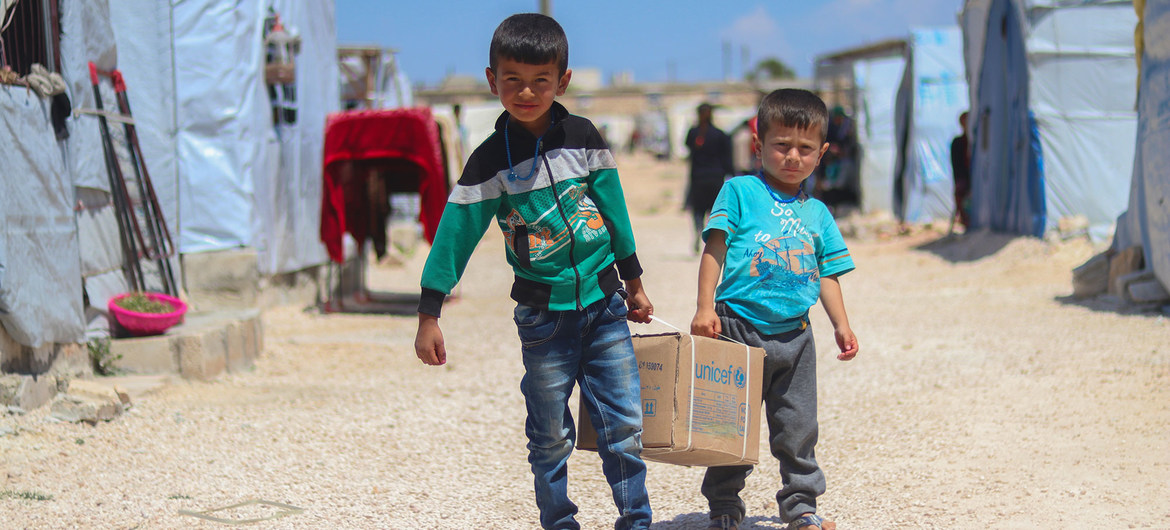
To nobody’s surprise, Syrian dictator Bashar Assad’s bloc won a majority of seats in the country’s parliamentary election, dismissed as a farce by the exiled opposition. Assad’s “National Unity” list won 177 seats in the 250-member parliament, the electoral commission announced July 22. As in the presidential elections that just as predictably confirmed Assad’s hold on the presidency in 2014, millions of people displaced by the war were not able to vote. “Simply put, these are illegitimate elections. The regime chose the candidates, even the independent ones, and they elected them,” said Yahya al-Aridi, a member of the opposition committee at UN peace talks in Geneva. “The people in Syria did not have the freedom to vote… This was a theater play by the regime.” (Al Jazeera, DW)
The elections were held amid a deepening economic crisis in the country. Syrian communities devastated by years of civil war now face an acute hunger crisis, just as urgent action is needed to prevent COVID-19 from spreading, UN humanitarian leaders warned ahead of a major donor pledging conference late last month.
“Syria today is facing an unprecedented hunger crisis as the prices of basic foods reach levels unseen even at the height of the nine-year conflict,” said World Food Program representative Elisabeth Byrs, noting a 200% food price hike in under a year. “We’ll continue our work, we’re on the ground… We’re helping 4.8 million people who need food assistance from WFP in Syria’s 14 governorates. We’re going to carry on, but to do that we need $200 million urgently.”
With more than half of Syria’s pre-war population—over 13 million people—now displaced across the country or refugees, UN humanitarian coordinating body OCHA echoed the need for international support at the funding summit in Brussels. “A generation of children has known nothing but hardship, destruction and deprivation,” said Jens Laerke of the Office for the Coordination of Humanitarian Affairs. “Now over 11 million people still inside Syria need aid and protection. The economy across the region is imploding, in Syria it is imploding, not least due to the impact of COVID-19.”
To date, the $3.8 billion Humanitarian Response Plan for Syria is only 30% funded, Laerke added. (UN News)
A controversy over UN aid deliveries to areas not under regime control was temporarily resolved with passage of Security Council resolution 2533 on July 11, allowing delivery of food, medicine and other assistance through the Bab al-Hawa border crossing with Turkey. Russia and China, which had vetoed proposals for wider aid deliveries, abstained on 2533. (UN News, Reuters)
With the lines of control in contested Idlib governorate in the north largely frozen since the COVID-19 crisis, Israel continues to carry out sporadic air-strikes in the southwest. In its latest operations inside Syria, the IDF warplanes struck targets across from the Israeli-occupied Golan Heights July 24, allegedly in response to mortar fire from the over the line. “A number of targets were struck, including SAF [Syrian Armed Forces] observation posts and intelligence collection systems located in SAF bases,” a statement said. (EA Worldview)





Israel bombs Syria —again
Presumed Israeli strikes on military targets south of Damascus Sept. 1 killed several people, with conflicting death tolls reported. The Syrian Observatory for Human Rights said the strikes killed one civilian, three government troops and seven allied foreign fighters. (MEE)
Israel bombs Syria —again
Israel’s latest missile strikes inside Syria damaged one of the Assad regime’s missile production facilities. Satellite images confirm the destruction of one building and the damage of another at the al-Safira complex outside Aleppo. Following standard practice, the Israel Defense Forces did not comment on the strikes.
Israel bombs Syria —again
Israel struck targets in southern Syria on Jan. 6 in the third such attack in nearly 10 days. Missiles fired from the Golan Heights apparently targeted positions of Iran’s Revolutionary Guards. (Haaretz) A widespread theory in the region holds that Russia has given Israel a free hand to strike Iranian targets in Syria.